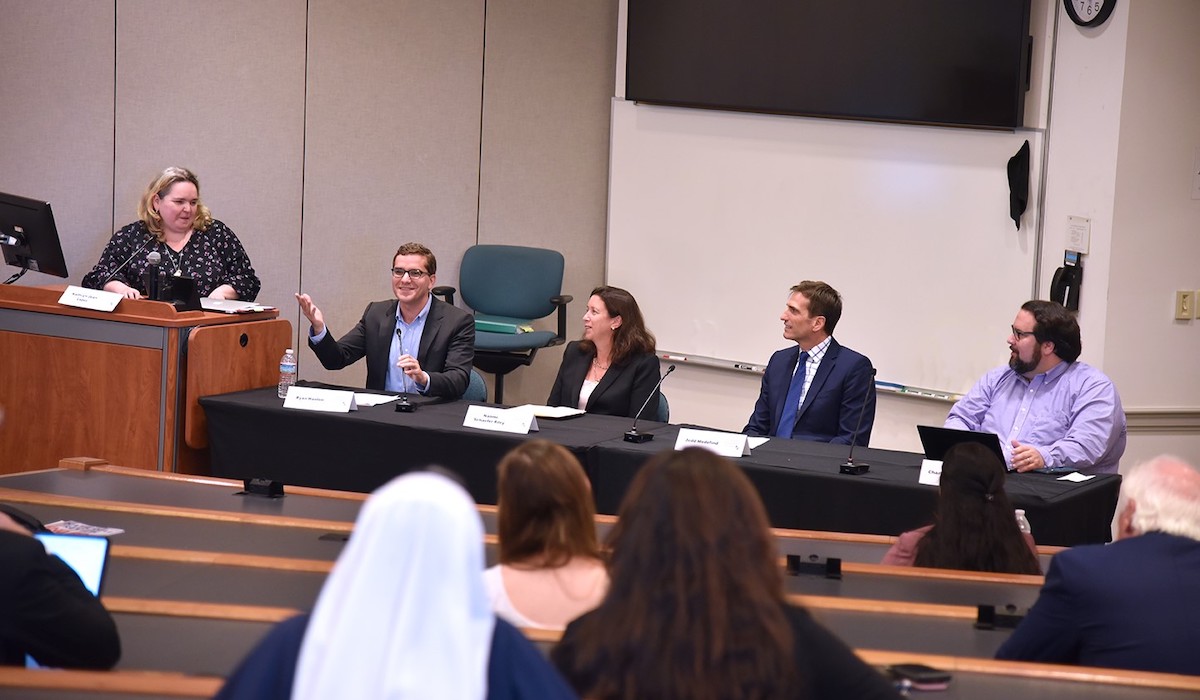

On Sept. 22, the Center for Law and the Human Person hosted experts from fields related to adoption, orphans and child welfare to participate in a panel discussion on “The Role of Adoption in a Post-Dobbs America.”
“It's fitting that The Catholic University of America would be the place to hold such a discussion and really sit down and get practical,” said panel moderator Kathryn Jean Lopez, who is editor-at-large of National Review and an adoption advocate. “There's a renewed urgency post-Roe for pro-life Americans to creatively lead and make sure that every woman knows the options that aren't abortion when she is facing an unplanned pregnancy. That means we need to be the field hospital Pope Francis talks about to accompany and be instruments of God's love and healing in lives.”
Three of the four panelists have adopted children and each of them specializes in work to assist with adoption, foster care, child welfare or child protective services. The four panelists included Charlie Camosy, professor of Medical Humanities at Creighton University School of Medicine; Ryan Hanlon, president and CEO of National Council for Adoption; Jedd Medefind, president of Christian Alliance for Orphans; and Naomi Schaefer Riley, resident fellow at American Enterprise Institute.
In 2020, there were 3.6 million live births and at least 930,160 abortions. In that same year, the number of infants placed for private domestic adoption was 19,658, showing abortion has the lead on adoption at a ratio of 50:1 in the United States.
“This panel was convened, to bring together scholars and adoption experts to provide a realistic assessment of the state of infant adoption in the United States, and especially in women’s decision making, and to think about whether and how, in both culture and law, we might promote adoption as a meaningful alternative to abortion,” said Elizabeth Kirk, director of the Center for Law and the Human Person.
Sarah Zakorski, communications director and adoption education director at the Louisiana Right to Life, joined the panel mid-way through the discussion to address a question relating to Louisiana state laws on foster care and adoption. Zakorski, who was herself adopted at age nine, works with Option Hope, an infant adoption curriculum offered to Louisiana high school students.
“Part of this conversation in expanding adoption and talking about adoption is ensuring that young people know about adoption before they encounter an unplanned or a crisis pregnancy,” she said.
With about 600,000 substantiated reports of abuse or neglect in the United States annually and about 2,000 annual child deaths from maltreatment, Riley, who works in child welfare, said many vulnerable women need assistance to safely and responsibly raise their children. “We need to, in this post-Dobbs world, take a careful look at those families and talk to those women, in a non-coercive way, about the possibility of adoption.”
Camosy thanked the University and those who initiated the panel for leading the charge. “There are a very large number of public policies which could be supported by those who otherwise have large differences, and policies which destigmatize adoption and make it more available to those who want it are certainly among them.”
The panel was supported by the Opt Institute, a non-profit research foundation that works to improve support for private infant adoption.